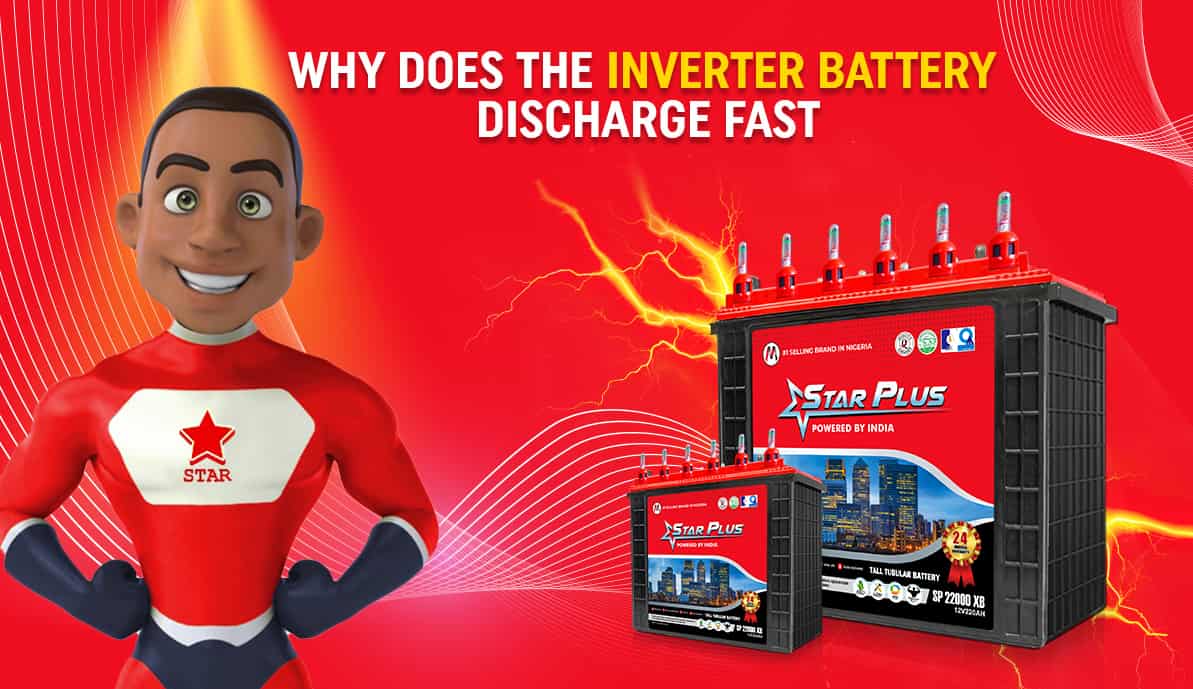Inverter Batteries have become essential components for providing uninterrupted power backup. Nigerian homes, offices, and industries are relying on high-powered inverter batteries to satisfy multiple power needs. But there’s a significant problem.
Users face issues with fast-draining inverter batteries. Quick discharge is leaving battery users in the dark sooner than anticipated, disrupting work, comfort, and other operations.
Are you wondering why inverter battery discharge fast? This blog can help you.
Star Plus Battery, renowned for its quality and reliability, offers key insights and solutions to resolve inverter battery drainage alongside ways to acquire superior performance.
What is Inverter Battery Drainage?
Inverter battery drainage is the loss of stored electrical energy. Sometimes, discharge can occur faster than the normal rate. In other situations, the battery might fail to hold a charge for the expected duration.
When the inverter battery loses its power faster than it should, it becomes a concern. Multiple reasons contribute to the inverter battery drainage, mostly when the battery is in storage.
Main Reasons Why Your Inverter Battery Drains Fast
Due to the common problem faced by many battery users, we have identified the common reasons behind battery discharge. Here’s what you need to know:
Overloading
Power overloading is a significant reason behind your inverter battery draining fast. Connecting too many appliances can quickly deplete your battery tank. If your total wattage exceeds the inverter battery’s capacity, it can drain your battery faster than usual.
Improper Charging
Poor charging facilities can be a significant reason behind the faster discharge of your inverter battery. Low grid voltage, faulty chargers, insufficient charging time, and dirty battery terminals can all result in improper charging.
Many users have a habit of overcharging or undercharging inverter batteries. This can create pressure on the battery and damage its internals, causing high energy drainage.
Battery Getting Old
Your inverter battery has a finite lifespan. If that has expired, then old inverter batteries have a high chance of draining fast. High-quality lead-acid batteries can last up upto 10 years. If you try to carry it above 12 or 15 years old, batteries might fail to work and drain in a shorter timespan.
Storage Problems
If you are wondering, “How do I stop my inverter batteries from draining?” Fix your storage. Operating an inverter battery in a hot environment can put pressure on its working capacity. Additionally, storing an inverter battery in a humid climate can increase dampness inside the terminals, which can hamper its working ability.
Incompatible Battery Size and Type
Using a battery that is incompatible with your inverter and charging system can result in faster discharge than usual. For example, if you are using a regular inverter battery for deep-cycle operation, it might not sustain the load required and discharge faster.
Want to Buy Tubular Inverter Battery for Your Home and Office?
Why Inverter Batteries Discharge while Charging?
Sometimes, your inverter battery can drain fast while charging. But why?
Incompetent charging is a significant concern. Many users have a habit of inconsistent charging. Since prolonged power cuts are common, if the battery remains discharged for a longer time, it might drain faster upon using it as power resumes.
In other cases, your inverter’s functional ability or settings might not match your battery’s capacity. It can cause faster drainage than usual.
How to Check Inverter Battery Health?
As you learn about the common and primary reasons behind your inverter battery’s drainage, it’s time to adopt necessary measures. If you are wondering, “How to stop my inverter battery from draining?”, check out the following tips:
Check Battery Load
Firstly, check your battery load. Do not connect non-essential appliances to your inverter battery. Switch off your inveter once power resumes. Recheck the discharge rate.
Check Battery’s Water Level
Water levels in your inverter battery should be at a certain level. If it drops to the mentioned level, your battery may experience functional issues. Top up the water level only with distilled water. Do not use any other type of water, as it might negatively react and cause significant problems.
Store Battery in a Cool and Dry Place
Store your inverter battery in a cool and dry place. Consider installing a thermostat in the storage area to monitor the room temperature. Ensure that it is in a dry environment, so that the risks of corrosion decrease.
Monitor Charging
Monitor your charging habits. Try to maintain a gap between each charging interval. Do not overcharge or undercharge your batteries. Maintain the charge that is specified for each battery.
Maintain Power Compatibility
You need to maintain power compatibility to prevent your inverter battery from draining fast. Choose the correct battery type and size. Your battery’s capacity needs to match your total power requirements. It’s better to choose a battery with sufficient capacity to handle both power loads and total electricity consumed.
Consult Professionals
Star Plus Battery is right here to assist you professionally in choosing battery size, type, and installation needs. Whether you need to match your power load with your battery type, we can help. Or if your inverter battery is behaving weirdly, we can help you. Ask a question about why your inverter battery drains faster, and we’ll help you.
Conclusion
Understanding why your inverter battery drains fast is the first step to taking care of your battery’s health. Try to address overloading, undercharging, and battery storage to prevent external damage and malfunctions.
Connect with Star Plus Battery today. If your battery needs to be paired with the right inverter model, you can check out our Combo products as well.
Don’t let fast draining inverter batteries curb you down from a comfortable life. Choose Star Plus Battery for the best inverter battery now.



0 Comments